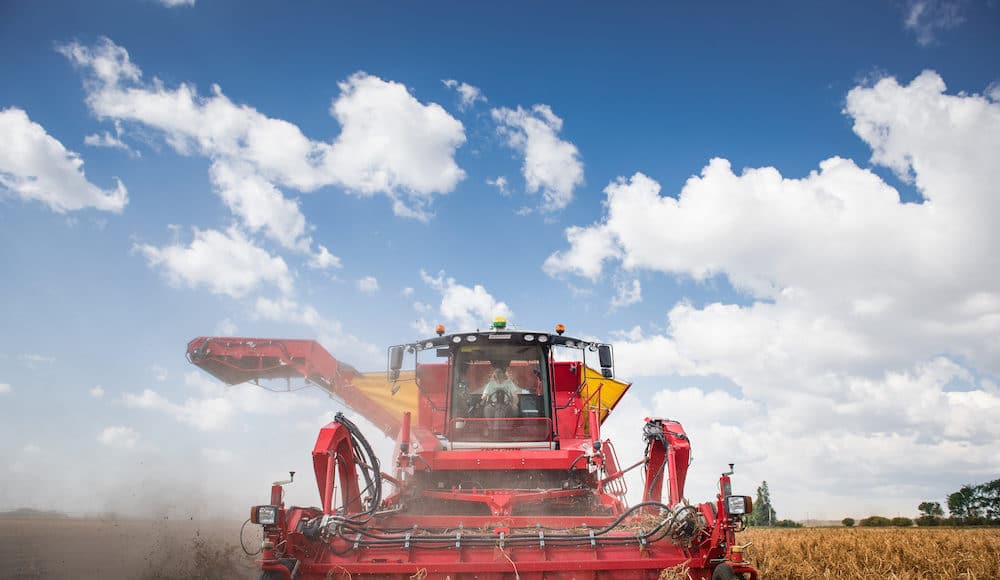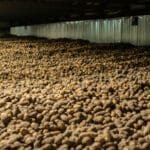Manitoba’s Swansfleet Alliance is marking its 40th year of producing seed potatoes this year.
Its founder, Dutch immigrant Henk Jonk, came to Canada in 1954 and eventually settled in the Swan Lake area of the province to farm. He began growing seed potatoes in 1976, and today his sons and grandchildren carry on the proud family tradition of providing high-quality seed to potato producers in Manitoba.
One of Henk’s grandsons, Russell Jonk, helps operate Swansfleet Alliance along with his dad and two uncles, his brother, and his sister and her husband. Jonk, 32, has been working full time on the farm ever since he graduated with a degree in agriculture from the University of Manitoba in 2006, and there isn’t anywhere else he’d rather be.
“I do enjoy it a lot. One of the great parts about farming is the variety in the work. It seems you get to do something different every day, and I’ve always really enjoyed the agronomy side of potato farming,” Jonk says.

Swansfleet Alliance farms approximately 10,000 acres, and of that about 1,700 acres are planted in potatoes each year. Roughly half the potato acres are dedicated to seed varieties such as Russet Burbank, Ranger Russet, Umatilla and Innovator. Russet Burbank processing potatoes are grown on the other half.
“We do a three-year rotation on our potato land,” says Jonk. “Typically, we’ll follow potatoes with a cereal, so either corn, wheat or rye. Following that it’s canola, and then we’ll go back into potatoes again.”
While the farm produces numerous other crops, potatoes remain its primary focus. Case in point is the state-of-the-art facility built 10 years ago that enables Swansfleet Alliance to quickly and efficiently process custom seed orders, including sizing, grading, cutting, and applying liquid and powder seed treatments.
“We’re probably one of the bigger seed growers in the province, and one of the reasons we are able to do that and still ship it all out to our customers in time every year is because we have a really great grading facility,” Jonk says.
The farm’s seed potato production is also isolated from processing potato fields in order to assure clean, high-generation seed for customers. In addition, all of Swansfleet Alliance’s potato acres — both seed and processing — are also inspected and certified by Canadian Food Inspection Agency officials.
“Keeping things sanitary and clean is really of utmost important to a seed grower, and that’s the reason that we certify every acre,” Jonk says. “Even though we’re growing processing potatoes, we still think of ourselves as a seed farm first.”
Irrigation Investment Pays Off
Jonk notes that Swansfleet Alliance began irrigating some potato fields in 2006, and today all of its potato acres are irrigated.
“Irrigation probably has been one of the biggest single investments on the farm in the last 10 years. This year, we had 27 centre pivots running on the farm, mostly on potatoes,” he says.
Jonk says the additional expense has definitely paid off in terms of providing higher-quality potatoes. “I don’t think we’d have the seed customers we do and … we wouldn’t have the processing contracts we have unless we had that irrigation.”
Swansfleet Alliance has begun utilizing variable rate irrigation and other innovative practices like bed planting on some of its potato acres.
“We’re always looking for new ways to try and control size and still optimize yield on a field, so we’re looking at different management systems to try and maximize our yield while still being able to provide a size profile that’s good for customers,” Jonk says.
About 30 per cent of Swansfleet Alliance’s potato production is bed planted this year. The technique allows tighter row spacings that enable more potatoes to be planted per acre than the conventional ridged row system. This can potentially translate into higher yields. But as Jonk points, switching to a different system always involves new challenges for farmers.
“There definitely is some opportunity there [with bed planting], but it does take a shift in the way you do things, all the way from planting to herbicide planning to harvesting,” he says.
Jonk believes planting whole seed is another area that holds promise for farmers.
“I think there’s opportunity in shifting some production to a whole seed production system, similar to systems they use in Europe,” he says. “We can definitely provide a better quality product if we moved to a whole seed system.”
In addition to reducing the risk of disease infection in tubers, using whole seed also eliminates seed cutting costs for farmers.
“It’s not a huge part of our business but I see potential there,” Jonk says. “It seems like every year we have a few more customers who are interested in it and it seems to be working out well for them so far.
“We’d like to take this opportunity to thank our customers,” he adds. “We appreciate the business over the last 40 years, and look forward to providing high quality seed and process potatoes to them in the future.”











